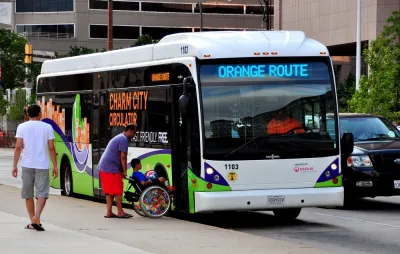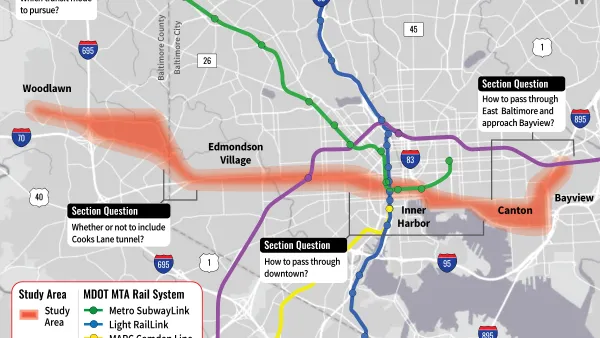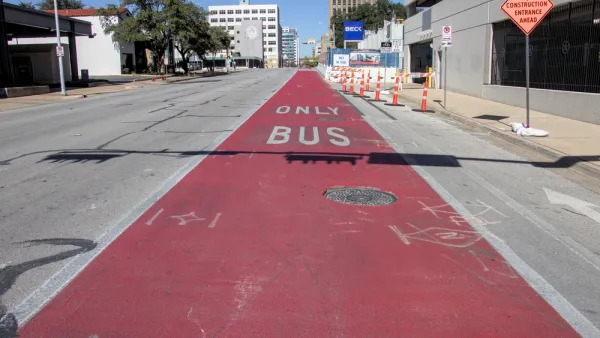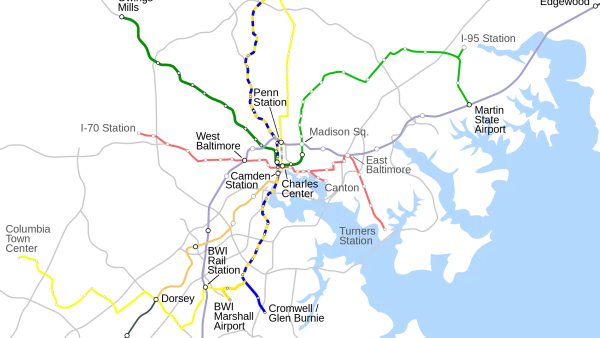A funding formula that frequently determines the scope and quality of transit in the state of Maryland could be reformed by state legislators this year.

Brian O'Malley reports on legislation in Maryland that would change the funding formula for transit everywhere in the state.
Currently, Maryland transit systems are handcuffed by a requirement that all transit systems pay for at least 35 percent of its operating budget with rider fares—the farebox recovery mandate, to use the technical term. The state's farebox recovery affects "Maryland Transit Administration (MTA) products, like MTA local (aka Baltimore’s bus service) and commuter buses (which primarily serve the District), the three MARC commuter lines, and Baltimore’s Light Rail and Metro subway lines," according to O'Malley.
"The result of complying with this mandate is that MTA regularly has no choice but to refrain from investing in services and maintenance even if those things would grow ridership and revenues over time," according to O'Malley. "In public meetings, MTA officials often cite the farebox recovery mandate as a limiting factor when responding to requests to provide service to growing employment sites or other destinations, like a new Amazon warehouse distribution facility in Baltimore."
In response, two bills are moving through the Maryland State Legislature. House of Delegates Bill 271 and Senate Bill 484 have both passed through committee, with "broad support among central Maryland transit advocates, business leaders and riders," according to O'Malley.
FULL STORY: How Maryland handcuffs its transit system, and how that could change

National Parks Layoffs Will Cause Communities to Lose Billions
Thousands of essential park workers were laid off this week, just before the busy spring break season.

Retro-silient?: America’s First “Eco-burb,” The Woodlands Turns 50
A master-planned community north of Houston offers lessons on green infrastructure and resilient design, but falls short of its founder’s lofty affordability and walkability goals.

Delivering for America Plan Will Downgrade Mail Service in at Least 49.5 Percent of Zip Codes
Republican and Democrat lawmakers criticize the plan for its disproportionate negative impact on rural communities.

Test News Post 1
This is a summary

Test News Headline 46
Test for the image on the front page.

Balancing Bombs and Butterflies: How the National Guard Protects a Rare Species
The National Guard at Fort Indiantown Gap uses GIS technology and land management strategies to balance military training with conservation efforts, ensuring the survival of the rare eastern regal fritillary butterfly.
Urban Design for Planners 1: Software Tools
This six-course series explores essential urban design concepts using open source software and equips planners with the tools they need to participate fully in the urban design process.
Planning for Universal Design
Learn the tools for implementing Universal Design in planning regulations.
EMC Planning Group, Inc.
Planetizen
Planetizen
Mpact (formerly Rail~Volution)
Great Falls Development Authority, Inc.
HUDs Office of Policy Development and Research
NYU Wagner Graduate School of Public Service





























